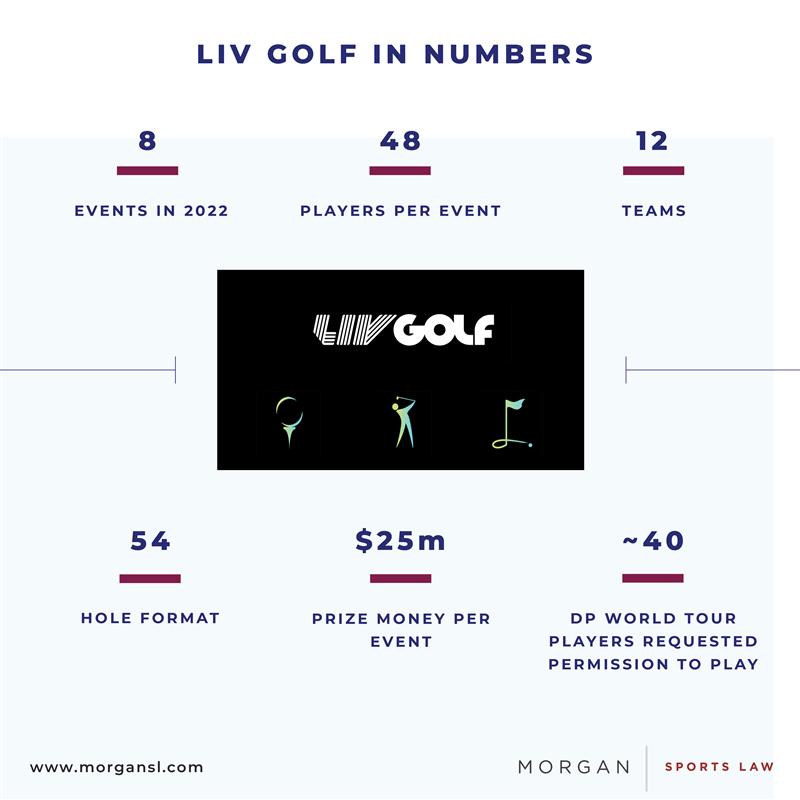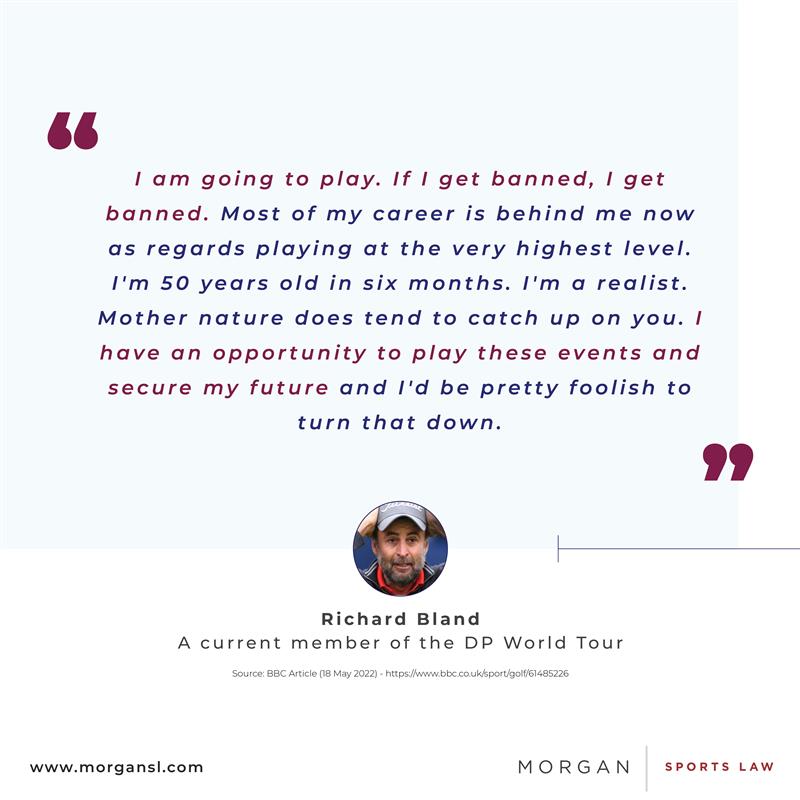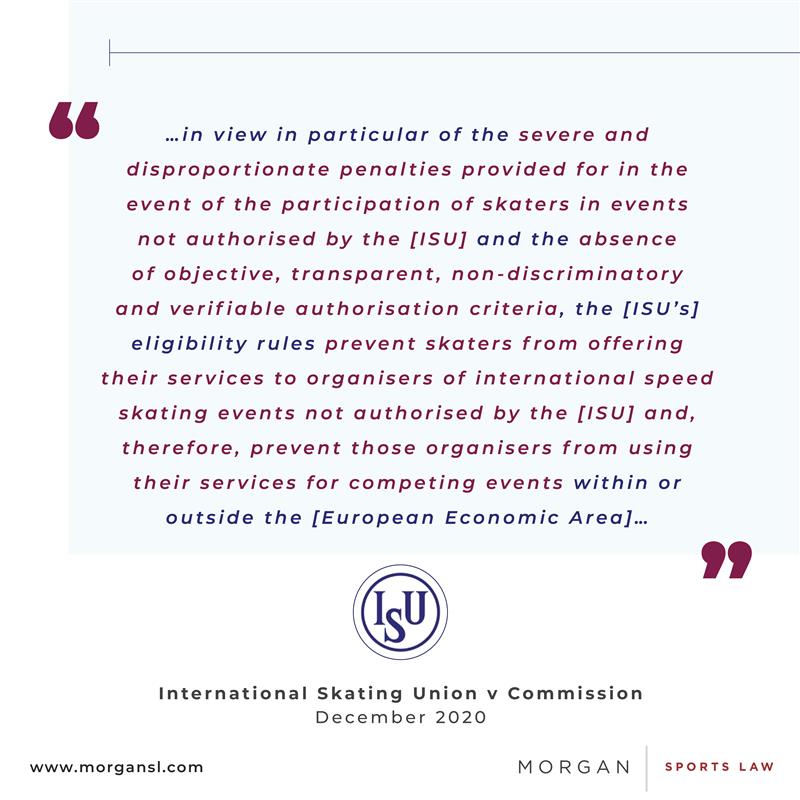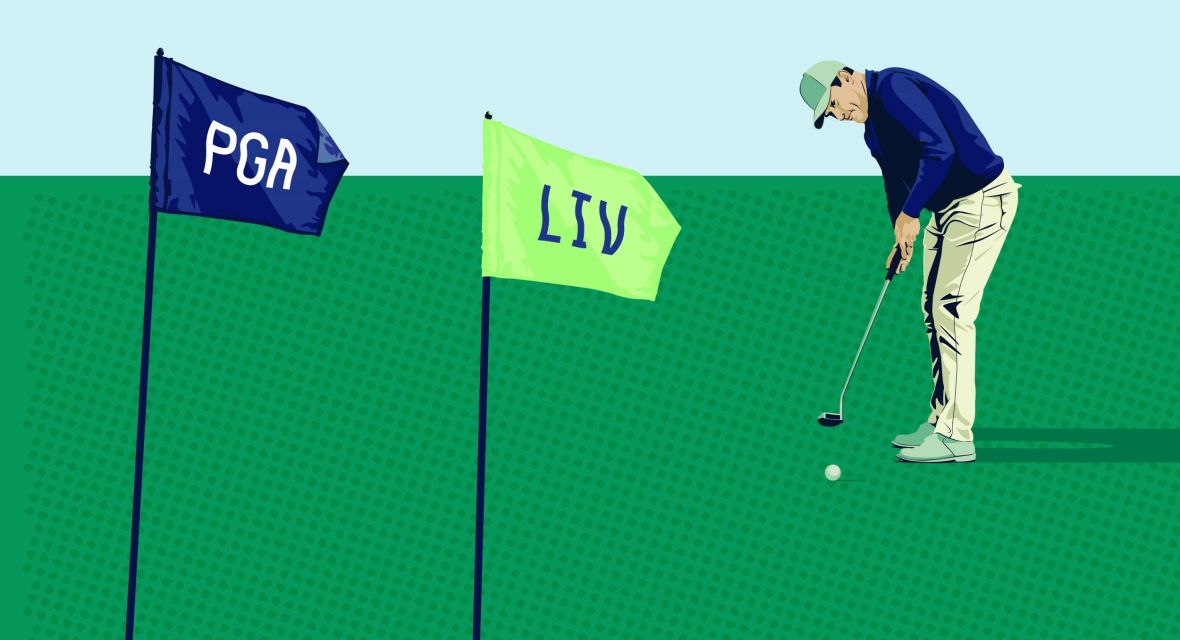LIV GOLF AND THE DP WORLD TOUR – WHAT IS PLAYERS’ LEGAL POSITION?
The first event of the much-talked-about LIV Golf series will take place in London from 9 to 11 June, with little currently known as to which players will take part.
LIV Golf is backed by Saudi Arabia’s Public Investment Fund and aims to “supercharge” professional golf, including via the introduction of enormous prize funds. Indeed, it has been reported that the individual winner of the opening LIV Golf event will receive US$4 million, almost twice as much as the winner of this week’s PGA Championship will take home.
To date, men’s professional golf has been dominated by the US-based PGA Tour and the UK-based European Tour, now known as the DP World Tour. Both tours operate tournaments which, for the most part, are traditional 72-hole, individual stroke play events. In contrast, LIV Golf will use a 54-hole format with an additional team element.

Unsurprisingly given the riches on offer, various golfers have asked the PGA Tour and/or DP World Tour (as appropriate) for a release to allow them to take part in the LIV Golf event commencing on 9 June.
Equally unsurprisingly given LIV Golf’s financial firepower, the PGA Tour and DP World Tour view it as a threat and have therefore refused to grant the requested releases.
That raises various questions. In particular:
- Do the tours’ regulations allow them to sanction players who participate in a LIV Golf event?
- Would disciplinary action by the tours over participation in a LIV Golf event be lawful?
- What should potentially affected players bear in mind?
In briefly addressing those questions, this article focuses on the position as regards the DP World Tour. However, it is worth noting that decisions of the PGA Tour may (in addition to any US anti-trust action) be challengeable under European competition law, to the extent that they produce effects within the European Union, and, similarly, may be challengeable under UK competition law, to the extent that they produce effects within the UK.
Do the DP World Tour’s regulations allow it to sanction players who participate in a LIV Golf event?
Ignoring the legalities for a moment, whether the DP World Tour can, practically, prevent members from playing in a LIV Golf event may depend to some extent on the sanctions which it can threaten were a player to participate without having obtained a release.
Indeed, given that $120,000 is reportedly on offer for last place in a LIV Golf event, any fine imposed by the DP World Tour would have to be hefty were it to act as sufficient disincentive. However, it may be that the DP World Tour’s Membership Regulations (which are not publicly available) set no cap on the level of fine that can be imposed.
The threat of the potential suspension and/or termination of a player’s DP World Tour membership would likely serve as a greater disincentive for most players. That said, Richard Bland has declared his intention to participate in LIV Golf regardless of the consequences. With respect to Mr Bland, the position may be different for younger players.

In that regard, the DP World Tour’s Articles of Association (the “Articles”) provide that, subject to the Membership Regulations (which, as noted, are not publicly available), the board has the power to suspend membership. In addition, a player’s membership may be terminated where the board considers that:
- 32.1.1 he is guilty of conduct which has or is likely to have a serious adverse effect on the Tour or bring the Tour or any or all of the Members, directors and committee members into disrepute;
- 32.1.2 he has acted or has threatened to act in a manner which is contrary to the interests of the Tour as a whole;
- 32.1.3 he has failed to observe the terms of these Articles and/or the Regulations (including the Code of Behaviour as set out in the Regulations); or
- 32.1.4 it is in the Tour's best interests to do so,
Whilst the Articles do not specifically provide for lifetime bans from membership, it is possible that the DP World Tour might introduce conditions for re-acquiring membership which exclude players who have previously participated in LIV Golf events.
Thus, it would appear that, under the Articles, the DP World Tour could impose sanctions on players who take part in LIV Golf events without having obtained a release, including, at least in theory, by terminating the player’s membership.
However, any rules governing membership, and any decisions taken thereunder, must be lawful.
Would disciplinary action by the DP World Tour over participation in a LIV Golf event be lawful?
The current golf dispute has clear similarities to the International Skating Union (“ISU”) case, which was decided by the General Court of the European Union in December 2020.
That case concerned a competition law challenge against the ISU, ice skating’s international federation. In short, a new-format skating competition, which was to be held in Dubai, had been launched but then had to be abandoned because, in particular, insufficient numbers of professional skaters had signed up to participate. That lack of participation was the result of the ISU’s rules which exposed skaters to a lifetime ban from ISU competitions if they participated in any competition that was not authorised by the ISU (such as the proposed Dubai competition).
Crucially, the General Court found that the ISU’s rules did not ensure effective access to the relevant market by third parties and allowed it to distort competition by favouring its own events to the detriment of others. Accordingly, the General Court concluded that the ISU’s rules breached EU competition law and thus were unlawful.
Further, and in ruling that the ISU’s application of its rules in refusing to authorise the Dubai competition was in breach of EU competition law (notwithstanding that Dubai is, of course, outside the EU), the General Court stressed that (emphasis added):

As noted above, there are clear similarities between the stance that the DP World Tour has adopted and that previously taken by the ISU when faced with a competitor. Indeed, and crucially, the DP World Tour’s regulations seemingly (also) allow for the imposition of “severe and disproportionate penalties” when a golfer participates in an event without permission such as to arguably prevent golfers from offering their services to the organisers of a competitor event.
Given that, again similarly to the ISU, the DP World Tour has a dominant position in the market (namely men’s professional golf), it is difficult to see why a tribunal would hold the DP World Tour to a lesser standard.
Accordingly, and in extreme summary, it seems likely that were the DP World Tour to take disciplinary action against a player for having participated in a LIV Tour event without having obtained a release, that player might well have a good argument that such disciplinary action is unlawful.
What should potentially affected players bear in mind?
These are exciting but potentially dangerous times for professional golfers. It is therefore vital that players take independent advice to ensure that their rights are protected.
Notably, LIV Golf has offered to “defend, reimburse and represent” any players who face disciplinary action for their participation in a LIV Golf event. Whilst the offer of reimbursement might well be attractive, LIV Golf has its own interests to uphold which will not necessarily be entirely aligned with those of a player facing disciplinary action. Accordingly, players ought not to overlook that reality when considering their next steps.
Further, players should note that, under the Articles, they have a right to be heard prior to any termination of their DP World Tour membership, and that the Membership Regulations are likely to provide for other procedural safeguards where a lesser sanction (e.g. suspension) is proposed.
Morgan Sports Law’s experience of acting in relation to breakaway leagues, competition law disputes and disciplinary cases makes it well-placed to assist any affected players. Please contact Tom Seamer with any enquiries.
Authored by
Tom Seamer
Barrister
Ben Cisneros
Trainee Solicitor
Footnote
1. See ‘Who we are’, available at: www.livgolf.com/about
2. See ‘How it works’, available at: www.livgolf.com/format
3. Including Phil Mickelson, Sergio Garcia and Lee Westwood, see: https://www.skysports.com/golf/news/12176/12616252/ian-poulter-liv-golf-invitational-series-event-retains-lots-of-pluses
4. On 10 May 2022, the PGA Tour issued its decision (see: https://www.golfchannel.com/news/pga-tours-best-interest-players-denied-waivers-play-first-liv-golf-event) to deny releases for the first LIV Golf event. It is understood that, under the PGA Tour’s regulations, members are entitled to be released for up to three conflicting events each season (outside of North America), but the PGA Tour retains a discretion to deny such releases, in certain circumstances. As to the DP World Tour, it confirmed on 11 May 2022 (see: https://www.golfchannel.com/news/pga-tours-best-interest-players-denied-waivers-play-first-liv-golf-event) that the deadline for requesting a release to play in the LIV Golf event in June had passed and that, in accordance with the Members’ Regulations Handbook, it would evaluate each request “on a case-by-case basis”. It is not clear what its rules on player releases are (as the Members’ Regulations Handbook is not publicly available). However, it appears that the DP World Tour has followed its US counterpart in denying the release requests (see: https://www.bbc.co.uk/sport/golf/61485226).
5. See Article 31
6. See ISU v. Commission at ¶¶ 118-119
7. See ISU v. Commission at ¶ 120
8. See ISU v. Commission at ¶ 129
9. Although the DP World Tour is constituted in the UK, EU law may nonetheless be applicable if its decisions produce “immediate, substantial and foreseeable effects on the territory of the European Union” (see ISU v. Commission at ¶ 125). Further and in any event, the English courts remain bound by an obligation to ensure consistency between UK competition law and pre-Brexit EU competition case law (see s.60A of the Competition Act 1998) and, thus, the ISU case would prima facie be authoritative even in a challenge under English law.
10. See Article 32.2


